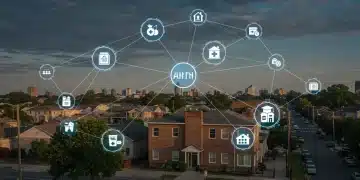AI in US community college healthcare training: transforming lives

AI in US community college healthcare training enhances learning by integrating innovative technologies, preparing students for emerging roles in the industry while addressing challenges through strategic partnerships and professional development.
AI in US community college healthcare training is changing the way students learn and prepare for the workforce. Have you wondered how these advancements influence future healthcare professionals? In this article, we dive into the transformative effects of AI in training programs.
The impact of AI on healthcare education
The impact of AI on healthcare education is profound and far-reaching. With the integration of advanced technologies, educational institutions are evolving to better prepare students for a competitive and rapidly changing workforce. This transformation not only enhances learning but also improves patient outcomes in the healthcare sector.
Transformative Learning Experience
AI technologies offer a range of tools that create a more engaging and personalized learning experience. For example, adaptive learning platforms tailor educational materials to individual student needs, allowing for a deeper understanding of complex healthcare subjects. Additionally, these technologies facilitate real-time feedback, which helps students identify areas for improvement.
Benefits of AI in Education
- Enhanced accessibility for diverse learners
- Improved engagement through interactive simulations
- Data-driven insights for educators to refine their teaching methods
Such benefits are crucial in healthcare training, where students must grasp intricate details and procedures. With the help of AI, instructors can identify which students may need extra attention, ensuring nobody falls behind.
Preparing for Future Careers
Healthcare careers are increasingly requiring technological proficiency. As AI reshapes various sectors, programs in community colleges are incorporating lessons on AI tools and applications. This approach equips students with necessary skills that will make them highly sought after in the job market.
In the context of healthcare education, fostering these skills is essential. Students who are experienced in using AI can provide better patient care, given their understanding of data analytics and AI-driven diagnostic tools. Moreover, as technology evolves, continuous learning becomes vital during their careers.
Ultimately, the impact of AI on healthcare education signifies a pivotal shift towards more effective training programs. By embracing these technologies, community colleges will not only train competent professionals but will also enhance the overall quality of healthcare services.
Innovative technologies in community colleges

Innovative technologies in community colleges are transforming the way students learn, especially in the healthcare field. By integrating cutting-edge tools, these institutions provide an enriched educational experience that prepares students for real-world challenges.
Virtual Reality and Simulations
One of the most exciting technologies is virtual reality (VR), which allows students to immerse themselves in simulated environments. For instance, healthcare students can practice surgical procedures in a safe and controlled setting. This hands-on approach enhances understanding and builds confidence.
Data Analytics in Learning
Another key innovation is the use of data analytics to track student performance. By analyzing learning patterns, instructors can identify which areas students struggle with the most. This data-driven approach helps tailor educational plans and ensures each student receives the support they need.
- Predictive analytics for student success
- Real-time feedback through interactive platforms
- Personalized learning experiences based on individual data
Moreover, technologies like AI chatbots are becoming commonplace, providing students with instant support and answers to their queries. These advancements make learning more accessible and engaging.
Community colleges are also using mobile applications to enhance communication between students and faculty. These apps can provide resources, assignment notifications, and even virtual office hours, making education more interactive.
As innovations continue to evolve, the implementation of these technologies will play a crucial role in shaping the future of education in community colleges. Institutions that embrace these advancements will not only improve learning experiences but will also better prepare students for careers in healthcare and beyond.
Future careers in healthcare with AI training
Future careers in healthcare with AI training are becoming increasingly promising. With technology advancing rapidly, professionals equipped with AI skills will be in high demand. This intersection of healthcare and artificial intelligence is reshaping the job landscape.
Emerging Roles in Healthcare
As AI integrates into healthcare systems, new job titles and roles are emerging. For instance, we are seeing positions such as AI healthcare analyst and telemedicine coordinator. These roles focus on using AI data to enhance patient care and streamline healthcare processes.
Skill Sets Required
- Data analysis to interpret patient information
- Understanding machine learning algorithms
- Familiarity with healthcare regulations and best practices
Students prepared with AI training will have a competitive edge. The ability to analyze data and use AI tools effectively will be key in improving patient outcomes and operational efficiencies in healthcare settings. Moreover, knowledge of technology helps clinicians make informed decisions based on data-driven insights.
Additionally, as the healthcare system shifts towards telemedicine, professionals with tech-savvy skills are essential. AI-powered platforms for remote care and monitoring will require trained staff who understand both healthcare protocols and technology.
Healthcare professionals who embrace AI training also play a significant role in shaping ethical standards and guidelines in this evolving landscape. They will need to consider the implications of AI on patient privacy and data security. This forward-thinking perspective is crucial in building trust with patients and the community.
Investing in AI training is not just about enhancing job prospects. It is about being part of a transformative movement in healthcare. Students who seize these opportunities today will pave the way for healthier futures through innovation and technology.
Challenges and solutions in integrating AI education

Challenges and solutions in integrating AI education in community colleges present unique hurdles. As institutions push toward modernization, they must navigate various barriers to implement AI effectively in their curriculum.
Identifying Key Challenges
One significant challenge is the lack of trained instructors. Many current faculty may not have the necessary knowledge or skills to teach AI-related subjects. This gap in expertise can hinder the development of robust programs. Additionally, there is often resistance to change within educational institutions. Some staff may be hesitant to adopt new technologies, fearing it could disrupt traditional teaching methods.
Resource Allocation
Budget constraints can also limit the ability to purchase essential software and hardware. Many community colleges operate on tight budgets, which may not allow for the investment in cutting-edge technology required for effective AI education.
- Limited funding for AI tools
- Inadequate infrastructure to support new technologies
- Challenges in curriculum development
Despite these challenges, innovative solutions are emerging. One approach is to partner with technology companies. These partnerships can provide schools with access to the latest tools and resources. By collaborating with industry, community colleges can also gain insights into real-world applications of AI, enriching their educational programs.
Additionally, community colleges can offer professional development for instructors. Workshops and training sessions can help faculty gain the skills needed to teach AI. This investment in teacher training ensures that students receive high-quality education, bridging the gap between technology and learning.
Furthermore, implementing blended learning models can be an effective solution. By combining online resources with traditional classroom instruction, colleges can make efficient use of available technology and maximize student engagement.
Overall, addressing the challenges facing AI education in community colleges requires creativity and collaboration. By working together, educational institutions can create pathways that equip students with essential skills for the future workforce.
FAQ – Questions about AI in Community College Healthcare Training
What are the main benefits of integrating AI education in community colleges?
Integrating AI education enhances student engagement, improves learning outcomes, and prepares students for emerging careers in healthcare.
What challenges do community colleges face in implementing AI education?
Challenges include limited funding, lack of trained instructors, and resistance to change from traditional teaching methods.
How can community colleges overcome these challenges?
Colleges can form partnerships with technology companies, provide professional development for instructors, and adopt blended learning models.
What career opportunities arise from AI training in healthcare?
AI training can lead to roles like AI healthcare analyst, telemedicine coordinator, and data analyst, greatly expanding job prospects for graduates.





